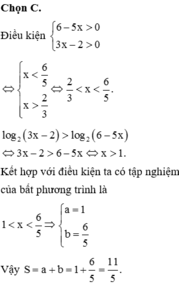Giải bất phương trình log 2 ( 3 x - 2 ) > log 2 ( 6 - 5 x ) được tập nghiệm là (a;b). Hãy tính tổng S=a+b
A. S = 8 3
B. S = 28 15
C. S = 11 5
D. S = 31 6
Hãy nhập câu hỏi của bạn vào đây, nếu là tài khoản VIP, bạn sẽ được ưu tiên trả lời.



a, Điều kiện: x > 0
\(log_3\left(x\right)< 2\\ \Rightarrow0< x< 9\)
b, Điều kiện: x > 5
\(log_{\dfrac{1}{4}}\left(x-5\right)\ge-2\\ \Rightarrow x-5\le16\\ \Leftrightarrow5< x\le21\)

a) \({\log _{\frac{1}{7}}}\left( {x + 1} \right) > {\log _7}\left( {2 - x} \right)\) (ĐK: \(x + 1 > 0;2 - x > 0 \Leftrightarrow - 1 < x < 2\))
\(\begin{array}{l} \Leftrightarrow {\log _{{7^{ - 1}}}}\left( {x + 1} \right) > {\log _7}\left( {2 - x} \right)\\ \Leftrightarrow - {\log _7}\left( {x + 1} \right) > {\log _7}\left( {2 - x} \right)\\ \Leftrightarrow {\log _7}{\left( {x + 1} \right)^{ - 1}} > {\log _7}\left( {2 - x} \right)\\ \Leftrightarrow {\left( {x + 1} \right)^{ - 1}} > 2 - x\\ \Leftrightarrow \frac{1}{{x + 1}} - 2 + x > 0\\ \Leftrightarrow \frac{{1 + \left( {x - 2} \right)\left( {x + 1} \right)}}{{x + 1}} > 0\\ \Leftrightarrow \frac{{1 + {x^2} - x - 2}}{{x + 1}} > 0 \Leftrightarrow \frac{{{x^2} - x - 1}}{{x + 1}} > 0\end{array}\)
Mà – 1 < x < 2 nên x + 1 > 0
\( \Leftrightarrow {x^2} - x - 1 > 0 \Leftrightarrow \left[ \begin{array}{l}x < \frac{{1 - \sqrt 5 }}{2}\\x > \frac{{1 + \sqrt 5 }}{2}\end{array} \right.\)
KHĐK ta có \(\left[ \begin{array}{l} - 1 < x < \frac{{1 - \sqrt 5 }}{2}\\\frac{{1 + \sqrt 5 }}{2} < x < 2\end{array} \right.\)
b) \(2\log \left( {2x + 1} \right) > 3\) (ĐK: \(2x + 1 > 0 \Leftrightarrow x > \frac{{ - 1}}{2}\))
\(\begin{array}{l} \Leftrightarrow \log \left( {2x + 1} \right) > \frac{3}{2}\\ \Leftrightarrow 2x + 1 > {10^{\frac{3}{2}}} = 10\sqrt {10} \\ \Leftrightarrow x > \frac{{10\sqrt {10} - 1}}{2}\end{array}\)
KHĐK ta có \(x > \frac{{10\sqrt {10} - 1}}{2}\)

Khoảng giá trị của x mà đồ thị hàm số \(y=log_2x\) nằm phía trên đường thẳng y = 2 là \(\left(4;+\infty\right)\)
\(\Rightarrow\) Tập nghiệm của bất phương trình \(log_2x>2\) là \(\left(4;+\infty\right)\)

a, ĐK: \(x+1>0\Leftrightarrow x>-1\)
\(log_{\dfrac{1}{3}}\left(x+1\right)< 2\\ \Leftrightarrow x+1>\dfrac{1}{9}\Leftrightarrow x>-\dfrac{8}{9}\)
Kết hợp với ĐKXĐ, ta được: \(x>-\dfrac{8}{9}\)
b, ĐK: \(x+2>0\Leftrightarrow x>-2\)
\(log_5\left(x+2\right)\le1\\ \Leftrightarrow x+2\le5\\ \Leftrightarrow x\le3\)
Kết hợp với ĐKXĐ, ta được: \(-2< x\le3\)

a, ĐK: \(x-2>0\Rightarrow x>2\)
\(log_2\left(x-2\right)< 2\\ \Leftrightarrow x-2< 4\\ \Leftrightarrow x< 6\)
Kết hợp với ĐKXĐ, ta được: \(2< x< 6\)
b, ĐK: \(2x-1>0\Leftrightarrow x>\dfrac{1}{2}\)
\(log\left(x+1\right)\ge log\left(2x-1\right)\\ \Leftrightarrow x+1\ge2x-1\\ \Leftrightarrow x\le2\)
Kết hợp với ĐKXĐ, ta được: \(\dfrac{1}{2}< x\le2\)

Chứng minh rằng : với mọi số tự nhiên n>1 thì \(\frac{1}{\sqrt{1}}+\frac{1}{\sqrt{2}}+\frac{1}{\sqrt{3}}+...+\frac{1}{\sqrt{n}}>\sqrt{n}\)\(\sqrt{n}\)